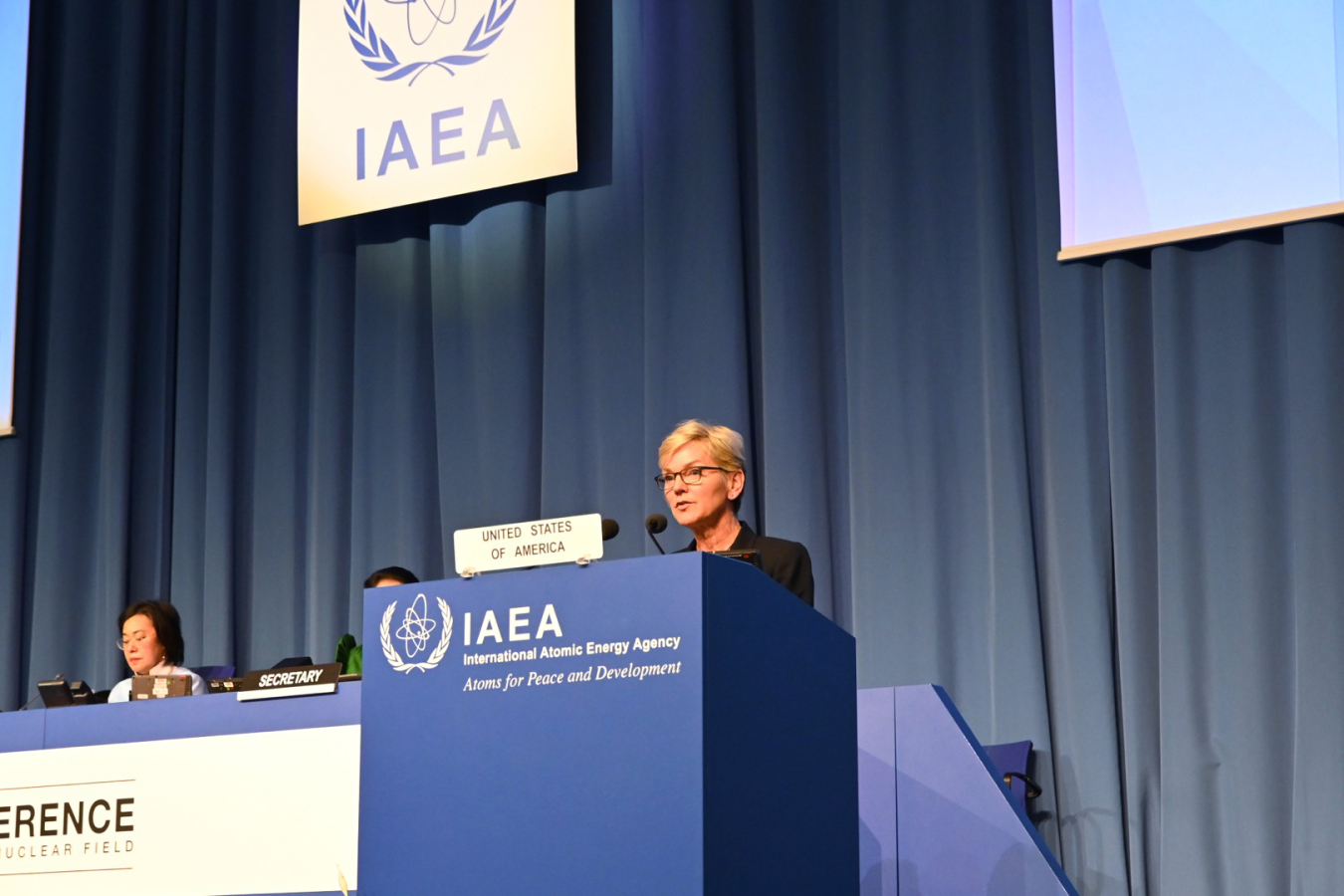Secretary Granholm delivers the U.S. National Statement at the 2023 IAEA 5th International Ministerial Conference Plenary Session in Vienna, Austria
September 25, 2023Vienna, Austria
Monday, September 25, 2023

It is an honor to join this group of esteemed diplomats and officials today, and let me extend my congratulations to Director General Grossi on his reappointment at this General Conference. Let me begin with a message from the President of the United States, Joe Biden:
This year’s General Conference marks 70 years since President Eisenhower presented his vision of “Atoms for Peace”—a future where nuclear technology could serve the needs, rather than the fears, of humankind.
Today, thanks to the leadership of the IAEA and the prowess of our scientific communities, peaceful nuclear technology serves many civilian needs—from fighting cancer to fighting climate change.
The United States is committed to the IAEA’s mission of helping all responsible nations expand such capabilities. We will continue to provide financial, technical, and capacity-building assistance, while upholding and promoting the highest nuclear safety, security, and nonproliferation standards.
My Administration is committed to preventing the malign use of nuclear technology by irresponsible actors undermining the very fabric of the United Nations Charter.
That is why earlier this year, I approved the U.S. Strategy for Countering Weapons of Mass Destruction Terrorism and Advancing Nuclear and Radioactive Material Security. This policy builds on decades of successful efforts to prevent non-state actors from acquiring materials that could be used to make a nuclear weapon, and sets out new goals to further reduce the production and accumulation of weapons usable materials worldwide.
It is also why we continue to stand by Ukraine as it confronts Russia’s continued brutal aggression, and support the IAEA’s efforts to prevent a nuclear emergency in the face of Russia’s irresponsible actions against Ukraine’s nuclear facilities.
This week, as we celebrate all the ways the IAEA has manifested President Eisenhower’s vision, we must recommit to delivering on his fundamental promise: that the peaceful uses of nuclear energy can unite a divided world.
I want to echo President Biden’s sentiments—in particular our broad support for the people of Ukraine, and the courageous IAEA staff on the ground there.
The United States is fully committed to peaceful uses of nuclear technology and to furthering the IAEA’s critical nuclear safety, security, and safeguards mission.
We pledge to protect the Nuclear Non-Proliferation Treaty—which underpins both our global disarmament efforts and our commitment to nonproliferation.
And we reaffirm our commitment to uphold the highest nonproliferation standards around the world, including through the AUKUS partnership with the United Kingdom and Australia.
I want to acknowledge and welcome the Kingdom of Saudi Arabia’s decision to rescind the Small Quantities Protocol to its safeguards agreement. We encourage other countries with old Small Quantities Protocols to either rescind or modify their SQPs as soon as possible.
I also want to expand upon President Biden’s call to action. Together, we must commit to not only live up to President Eisenhower’s vision, but modernize it with our 21st-century capabilities and values.
So let me add a few imperatives:
First, with the climate crisis firmly on our doorstep, we must leverage nuclear power’s full potential to help us achieve a net-zero carbon future while advancing energy security.
Nuclear energy is already a reliable source of carbon-free firm power. Emerging technologies present exciting opportunities to make it more affordable, accessible, and deployable.
And groundbreaking discoveries are broadening the bounds of what’s possible—of course, I’m talking about our recent achievement of fusion ignition, which brings us one step closer to harnessing the power of the Sun and the stars right here on Earth.
All of this is why the United States is committed to supporting the U.S. nuclear industry as it develops the next generation of nuclear technologies—while simultaneously prioritizing safety, security, and safeguards in their designs.
Second, we must leverage these scientific breakthroughs to advance development, by expanding civil applications of nuclear science and technology.
From fighting hunger and malnutrition to detecting and preventing disease, nuclear technologies can help all countries pursue the UN’s Sustainable Development Goals and improve people’s quality of life.
The United States is committed to supporting the IAEA in harnessing that extraordinary potential—particularly through Rays of Hope, IAEA’s flagship program to take on the global cancer care gap. Today, I am proud to announce the United States will contribute an additional $7 million for this life-saving program—bringing our total financial and in-kind contributions to this initiative to more than $47 million.
Third, we must focus not just on the work ahead of us, but the people behind it, too.
We know we can produce the strongest, most innovative, most effective solutions when we include a range of perspectives. That is why we must continue to expand and diversify the nuclear workforce, including by closing the gender equality gap.
The IAEA and Director General Grossi have shown tremendous leadership here.
Last year, Director General Grossi and I announced the Lise Meitner Professional Development Programme, which offers training and networking opportunities to women in the nuclear sector.
I am proud to say that the United States hosted the first cohort this year, and will host a second next month.
If we each commit to these imperatives, we can fully realize President Eisenhower’s vision in the modern age—where nuclear energy is a tool for peace, and a tool for unity.
More than ever, as an international community, we must continue to heed his words, and dedicate our strength to serve the needs of humanity.
Thank you.
###

